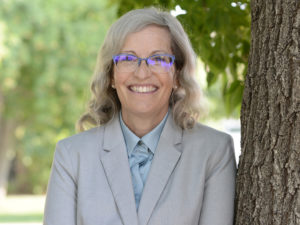 Jen Currin-McCulloch, assistant professor in the School of Social Work at Colorado State University, was recently awarded a prestigious grant to support young adults with cancer and raise national awareness of this often-overlooked population.
Jen Currin-McCulloch, assistant professor in the School of Social Work at Colorado State University, was recently awarded a prestigious grant to support young adults with cancer and raise national awareness of this often-overlooked population.
As a part of the Sojourns Scholar Leadership Program funded by the Cambia Health Foundation, Currin-McCulloch will spend the next two years training mental health providers to run virtual photovoice group interventions with young adults living with cancer. Each group intervention will conclude with an exhibit where the participants will share their photographs and narratives, with the goal of bringing the physical and psychosocial daily challenges and triumphs of living with cancer during one’s developmental prime into the public consciousness.
“This will enable me to reach out across the country to raise awareness and honor the experiences of young adults with cancer,” said Currin-McCulloch. “It is still a bit surreal, and quite an honor to be one of twelve people in the country selected across all palliative care professions.”
Currin-McCulloch says the crux of the challenges facing this population is how their cancer diagnosis interrupts a key stage of their identity development. “Layering a cancer diagnosis on at this stage of life creates significant disruptions. They are forced to think about life, death, their vocation, their social network, and uncertain future, when they should be living life to the fullest,” she said.
About the Sojourns Scholar Leadership Program
Currin-McCulloch was selected for the 10th and final cohort of palliative care professionals in the Sojourns Scholar Leadership Program, sponsored by the Cambia Health Foundation.
Peggy Maguire, president of the Cambia Health Foundation, said the program was launched to advance the next generation of palliative care leaders and improve care outcomes. “The strength of the Sojourns Scholars community gives me hope that compassionate care will become a standard part of one’s health care journey,” Maguire said.
Supporting young adults with cancer
Before entering academia, Currin-McCulloch worked as an oncology and palliative care social worker for two decades. Since her dissertation, her research has focused on improving wellness and outcomes for young adults with cancer and other life limiting illnesses.
“It’s tricky because folks may not know if they’re going to live a month, or two months, or more,” said Currin-McCulloch. “This creates lots of unknowns and fears. They might think, ‘If I express a hope for the future, am I jinxing myself?’ A lot of folks are not taking that leap.”
In contrast to the fear-based mindset, Currin-McCulloch suggests a positive spin. “I think the opposite of despair is hope,” she said. “How can we plant little seeds to help folks have something to look forward to? They may not be able to reach their ultimate dream, but we can try to reframe hopes to manageable tasks and connect hope and joy.”
Currin-McCulloch says this population faces particularly large challenges not often experienced by other cancer patients. They are more likely to receive their diagnosis in the later stages of their cancer, and it can be difficult to get effective chemotherapy, in part because young adults’ physical development and hormones can reduce the effectiveness of treatment. “They have that uphill battle from the start,” she said.
Young adults with advanced cancer or other life-limiting illnesses may have to move back in with their parents and many are hospitalized in settings where they are either surrounded by children, or adults of more advanced ages. These settings can lead to feelings of isolation or a lack of community or support.
Collecting stories, leaving legacies
Photovoice is a tool researchers use to collect images and narratives from participants to aggregate qualitative data.
“Looking at this young adult population: how do they communicate with each other and with the world?” said Currin-McCulloch. “I went straight to social media, where content often consists of an image and a brief narrative. In some ways, they are already journaling their lives like photovoice.”
The photovoice group interventions will run for eight weeks and are open to young adults with cancer across the country. Participants will share images and narratives about their experiences living with cancer. Currin-McCulloch says the interventions are meant to get to the core of what brought them joy, hope, and meaning before their illness, and where they find that now.
“I think one of the hardest things for these young adults to talk about is legacy,” said Currin-McCulloch. “I want to help folks think about what legacy they have already left on the world and what legacy they want to continue to leave. This project works on that footprint, by giving young adults a platform to share their experiences with their cancer peers and the public.”
Implementation
The project will culminate with Currin-McCulloch and her research team running a social-justice-oriented social media campaign with the photos and narratives the young adults shared from their time in the photovoice groups. The poignant images and narratives will bring the struggles and celebrations of young adults with cancer to light. Through sharing their stories with peers and the public, researchers and mental health providers hope to nurture the young adults’ self-efficacy in advocating for their needs, both physically and mentally.
“It is a group that I feel is marginalized – disenfranchised in general,” Currin-McCulloch said. “Particularly within oncology and palliative care, it’s so rare for people in this age group to be facing a life limiting illness.
“By sharing photos and stories, we hope to build community, share insights, and provide meaningful support.”
The School of Social Work is part of CSU’s College of Health and Human Sciences.